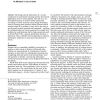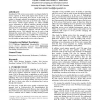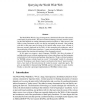341 search results - page 4 / 69 » Knowledge Retrieval and the World Wide Web |
IRAL
2003
ACM
14 years 22 days ago
2003
ACM
Text categorization, as an essential component of applications for user navigation on the World Wide Web using QuestionAnswering in Japanese, requires more effective features for ...
WWW
2005
ACM
14 years 8 months ago
2005
ACM
We describe Thresher, a system that lets non-technical users teach their browsers how to extract semantic web content from HTML documents on the World Wide Web. Users specify exam...
SOCO
2002
Springer
13 years 7 months ago
2002
Springer
Retrieving relevant information is a crucial component of cased-based reasoning systems for Internet applications such as search engines. The task is to use user-defined queries to...
WWW
2008
ACM
14 years 8 months ago
2008
ACM
Searching for Web service access points is no longer attached to service registries as Web search engines have become a new major source for discovering Web services. In this work...
PDIS
1996
IEEE
13 years 11 months ago
1996
IEEE
The World Wide Web is a large, heterogeneous, distributedcollectionof documents connected by hypertext links. The most common technologycurrently used for searching the Web depend...



